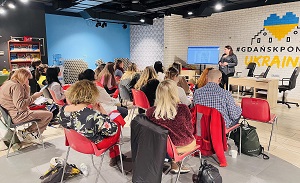Poland: Supporting women refugees
 LWF community centers work to identify and prevent gender-based violence
LWF community centers work to identify and prevent gender-based violence
(LWI) - “During a war, it is usual to be proud only of those fighting. Those who fight on the front lines, save lives, and volunteer. But we often forget about women brave enough to leave their homes and take their children to a safer place,” says Maria Kurashkina, producer and photographer. With her associate Polina Solyanko, project manager and copywriter, they realized the photography project “Ya Taka Smilyva” (“I am so brave” in Ukrainian) to celebrate Ukrainian women’s strength and courage. Their powerful portraits are currently displayed in the Lutheran World Federation (LWF) community center in Gdansk, Poland.
The exhibition is one of many events and activities the six LWF community centers in Poland have been organizing for the 16 Days of Activism Against Gender-Based Violence, from 25 November to 10 December every year.
Risks on the road
While in many refugee situations, most displaced people are women and children, it is particularly prominent for the refugee crisis caused by the war in Ukraine. Martial law prevents men of military age from leaving the country. Consequently, many women now assume the role of parenting alone and being the head of the household.
“Women migrating are more exposed to economic and emotional abuse when they travel and establish in a foreign country,” explains Viktoriia Svidovska, LWF Psychosocial Officer in Poland. “The challenges of navigating life in a foreign country, being the sole provider for children and elderly parents, while experiencing overall financial difficulties because of the war, put them at higher risk of being exploited or entering into abusive relationships.”
In a December report, the United Nations Office for Drugs and Crime (UNDOC) names “sexual exploitation, forced labor, illegal adoption, and surrogacy, forced begging and forced criminality” as the most common risks to women fleeing Ukraine. “There is particular concern around the risks of online sexual exploitation and abuse, as many Ukrainians use social media to seek support, and sex traffickers carry out the recruitment of victims and advertise exploitative services online,” the report elaborates.
Women who left Ukraine later may also have experienced violence during the conflict. A report by the SEREDA research project at the University of Birmingham lists numerous incidents where the armed forces of the Russian Federation used rape as a weapon of war, and where women were asked for sexual favors at checkpoints.
Awareness and referral
These traumas, sometimes combined with the experience of domestic violence, are part of the baggage the women bring with them, LWF Psychosocial Support officer Svidovska says. With its team of specialized psychologists, LWF Poland supports women facing violence. A referral system is in place for severe cases and LWF Poland partners with relevant authorities and organizations. For example, in Gdansk, LWF Poland refers survivors to The Municipal Center for Family Support which provides shelter for women at immediate risk. The center also works with the police, the prosecutor’s office, and the family court if children are involved.
LWF Poland has organized several workshops in its community centers to raise awareness about violence against women. For example, in Gdansk, LWF Poland partnered with the Municipal Centre for Family Support and the organization TAK. Three female psychologists, two Ukrainian and one Polish, gave a presentation on the different forms of violence against women and girls and how to get help. The workshops are open to everyone to foster integration.
Viktoriia Svidovska insists that sharing information is the first step to supporting women in need. LWF, to this end, conducts workshops, group discussions, and creative initiatives. “There is a need to raise awareness and make women understand all the existing forms of violence, including economic, psychological, and sexual. That is an important step to recognize whether they are experiencing violence and want to do something to address it”.
Celebrate strength
All LWF community centers offer creative activities to provide opportunities for women to meet and connect. For example, in Gdansk, creating floral arrangements or taking yoga classes offer a break and a moment to relax. “When you see these flowers, it is impossible not to feel good. You feel proud that you can do something so beautiful”, says Tetiana Savytska, a 65-year-old Ukrainian refugee who lives in Gdansk with her granddaughter. Others explain that the activity offered an opportunity to escape from their routine and feel better.
This kind of affirmation is vital to building self-confidence in a vulnerable situation. Many women underestimate their contribution to taking their families to safety and the mental load they shoulder daily. Photographer Kurashkina says: “Most of them think they ran away from their country. Through this project, I want to show all Ukrainian women that they have a lot of courage and did something really brave.”
I want to show all Ukrainian women that they have a lot of courage and that they did something really brave.
–Maria KURASHKINA, photographer
Share
LWF supports the people and churches of Ukraine through humanitarian programs in Poland and Ukraine and the diaconal work of its member churches in Central Eastern Europe. Our work is made possible through the donations of LWF members and other partners.
LWF/C. Kästner-Meyer, L. Gillabert
https://www.lutheranworld.org/news

